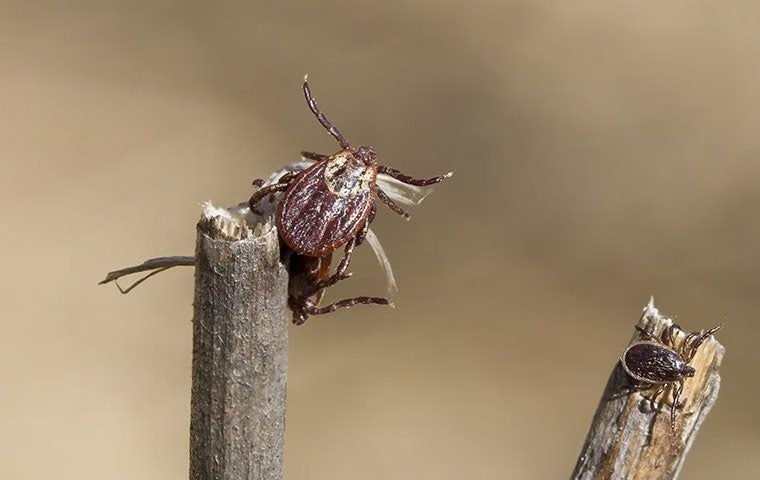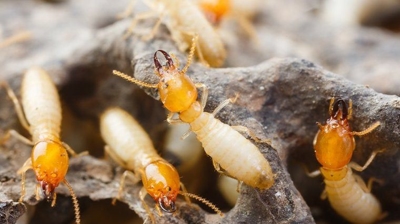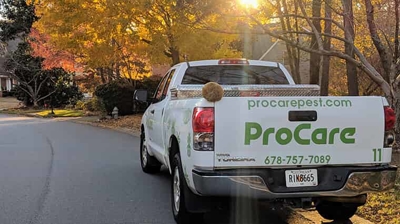
Flea & Tick Identification & Prevention

Fleas and ticks can be dangerous pests. If you’re struggling with an infestation on your property, your first stop should be Procare Pest Services. Our home pest control professionals can easily identify fleas and ticks on your property and create a unique solution to get rid of them!
Frequently Asked Questions About Fleas & Ticks
Have questions? We are here to help. Still have questions or can't find the answer you need? Give us a call at 678-757-7089 today!
-
How do I get rid of fleas and ticks?
To stop flea and tick populations around your property, follow some of these easy prevention tips:
- Keep the grass cut low and remove any outdoor debris to reduce flea and tick hiding spots.
- Make sure to treat any pets with flea and tick repellent under the guidance of your veterinarian.
- Wash pet bedding regularly and groom pets often to catch fleas and ticks before they become widespread.
- Clean and declutter your house, frequently vacuuming to pick up any stray flea or tick invaders.
And remember, if you’re struggling with a flea or tick infestation on your property, your first stop should be ProCare Pest Services. Our Marietta pest exterminators and commercial pest technicians can take care of your pest problems in no time.
-
Are fleas and ticks dangerous?
Fleas and ticks may be relatively small pests, but this doesn’t make them any less dangerous once an infestation has moved onto your property. Fleas and ticks are both quite prolific and can reproduce rapidly. This means that a handful of this pest on your property can quickly turn into a full-blown infestation.
Additionally, fleas and ticks are well-known for carrying some serious illnesses that may need medical attention. Fleas are known for passing murine typhus, tularemia, tapeworms, bubonic plague, and heartworms (to animals) through their bites, while ticks are known for diseases such as Lyme diseases, ehrlichiosis, anaplasmosis, and Rocky Mountain spotted fever.
Plus, flea and tick bites may cause allergies, and a large flea infestation on your property can bite your pets to the point where they are anemic, possibly even causing fatal reactions. All of these negatives are why you need to be so diligent about preventing fleas and ticks around your property.
-
What are fleas and ticks?
Fleas and ticks are commonly seen parasitic insects that feed via bites on their host that allow them to drink blood. Unfortunately, the preferred hosts for these pests are humans, cats, dogs, or other mammals, and both flea and tick populations can grow rapidly until they are completely out of control.
Additionally, fleas and ticks are most noticeable during the warmer months, but it is possible to pick up an infestation of these pests year-round.
- Fleas: Fleas belong to the order Siphonaptera and are small external parasites that typically grow around 0.13 of an inch in length. They are most commonly seen in the fur of dogs and cats, where their small size and impressive jumping skills allow them to move fast and hide out. Fleas will be dark brown in color and have hard exoskeletons which make them difficult to kill. Plus, any bite received from a flea is itchy, which can leave you and any pets around scratching constantly.
- Ticks: Belonging to the classification of Arachnid next to spiders and scorpions, ticks are further removed into the subclass of Acari. There are plenty of different tick species that are spread throughout the United States; these species will either have hard bodies or soft bodies and grow larger than fleas (especially when feeding), which further classifies them. The most commonly encountered tick species include the deer, lone star, and dog ticks.

Stay In The Know
-
 How to Tell If There’s Wildlife Activity in Your Home (and What to Do About It)Read More
How to Tell If There’s Wildlife Activity in Your Home (and What to Do About It)Read More -
 Keep Your Atlanta Home Fly-Free: How Procare Manages House Flies, Fruit Flies, and Other Nuisance FliesRead More
Keep Your Atlanta Home Fly-Free: How Procare Manages House Flies, Fruit Flies, and Other Nuisance FliesRead More -
 DIY pest control?Read More
DIY pest control?Read More -
 Procare: The Best Pest Control Solutions for Atlanta BusinessesRead More
Procare: The Best Pest Control Solutions for Atlanta BusinessesRead More -
 3 Signs You Might Have a Termite Problem in Atlanta—and How to Spot Them EarlyRead More
3 Signs You Might Have a Termite Problem in Atlanta—and How to Spot Them EarlyRead More -
 Your Year-Round Defense Against Fall Bugs and Joro Spiders in AtlantaRead More
Your Year-Round Defense Against Fall Bugs and Joro Spiders in AtlantaRead More -
 How To Solve Any Fall Pest issue in 2024Read More
How To Solve Any Fall Pest issue in 2024Read More -
 Keeping Spiders Out Of Your HomeRead More
Keeping Spiders Out Of Your HomeRead More









